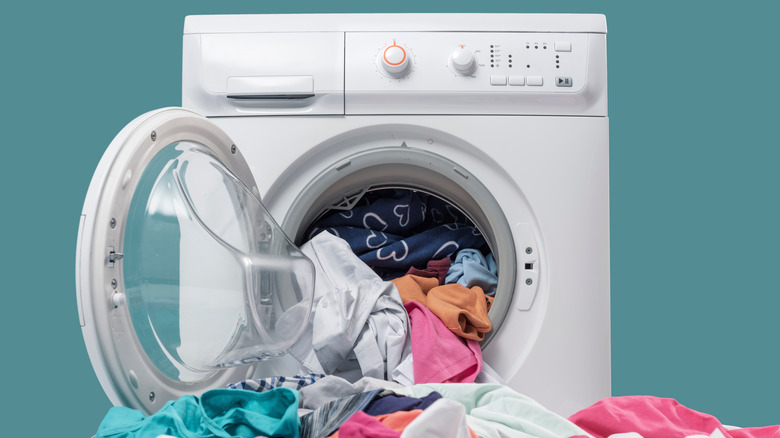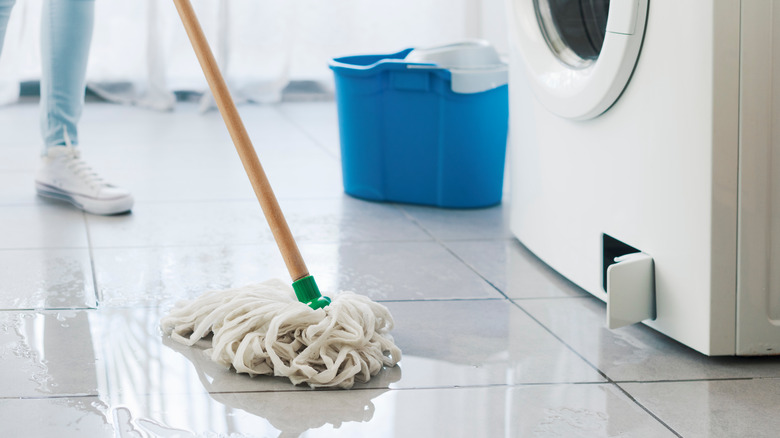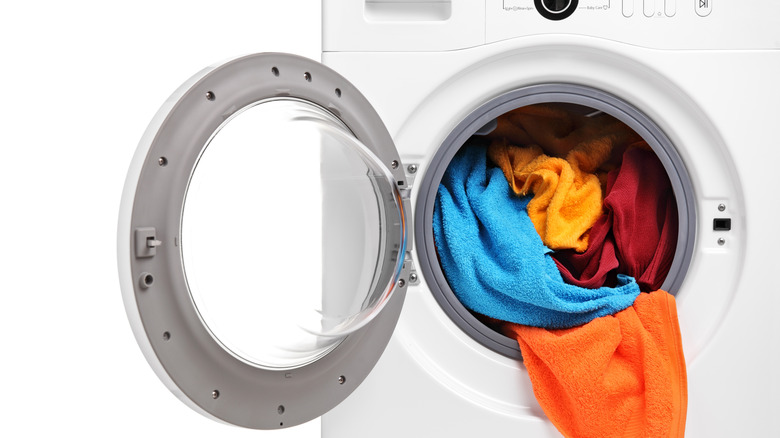The Dangers Of Overloading Your Washing Machine
Load after load, the family washing machine is a true champion of household chores, and while stuffing it full for each cycle may result in fewer jaunts to the laundry room, it's never a good idea. Extra-heavy loads not only reduce the machine's overall life but also negatively affect your clothes. Consumer Affairs reports that a washing machine repair can be costly, with the average bill ranging from $150 to $500 for parts and labor. And, if you're used to having a washer in your home, enduring a period without one is incredibly inconvenient, with laundry piling up quickly while you're waiting for the repair to be completed.
Doing laundry right can be tricky with all the sorting and selecting the right detergent and water temperature, but one definite way to harm your garments is to cram too many into the washing machine. It's best to follow the instructions in the manual provided with your device, but you can eyeball it by making sure not to fill it more than ¾ of the way to the top. GE Appliances recommends splitting clothes into two or three small piles rather than one huge one. Still tempted to utilize the drum's total capacity? Read on to learn why you shouldn't.
Why overloading the washer is bad for the machine
Washing machines are full of moving parts that are susceptible to damage. Overloading a washer puts unnecessary stress on these parts. Even just a few extra garments can add significant weight, straining the motor and potentially causing it to blow. The Portable Laundry explains that the motor is responsible for the motion of the drum, which is necessary to clean the items in the load. If a repair technician determines the cause of damage is due to machine overloading, it can void the warranty coverage, and you may be responsible for paying out-of-pocket expenses to fix or replace parts.
Overstuffing the washer can also cause the drum to spin in an unbalanced way. Over time, this can wear on the bearings and the belt. You'll know if the load isn't balanced because the machine may move around, and it will make loud pounding or squealing noises. Peppers Home and Garden says it may even leak water onto the floor during the spin cycle if you have a front-loading machine. Loading the machine properly can help lengthen its life and keep the repair bills at bay.
It's also bad for your garments
Items must be able to move freely within the drum for proper cleaning. Overloading the machine prevents this from occurring and can cause damage to your garments or result in items not being thoroughly washed, warns Sears Home Service. Every washer has a load capacity specific to its size and brand. When this is exceeded, zippers, buttons, and additional embellishments can hook onto other garments, causing permanent fabric damage such as holes and tears. And, because the clothes become saturated with water in the drum, they turn into one big, soggy clump. Because of the mass of wet garments, detergent isn't able to flow between the items, resulting in them being not-so-clean.
Another potential clothing problem caused by overloading your washing machine? Orphaned socks. It's true — the dryer isn't always to blame. Socks and other small items can be sucked into the drainage line, causing a clog. To help prevent smaller garments from being pushed into the drainage pipe, place your laundry items in the washer in loose piles within the outer realm of the drum. Doing so might save you from having to call in a repair technician.


